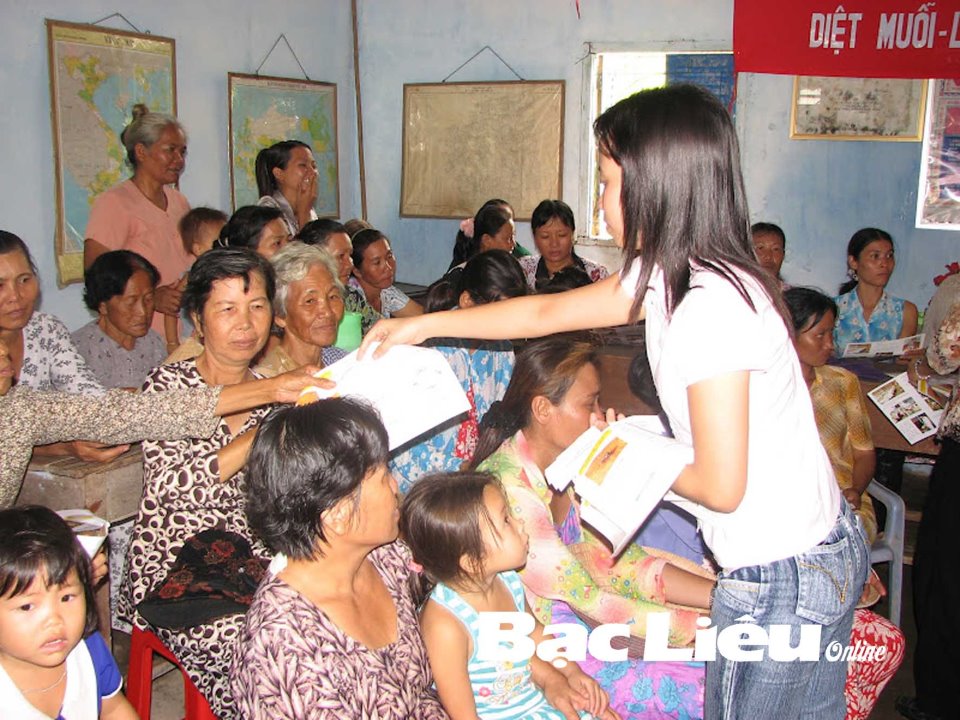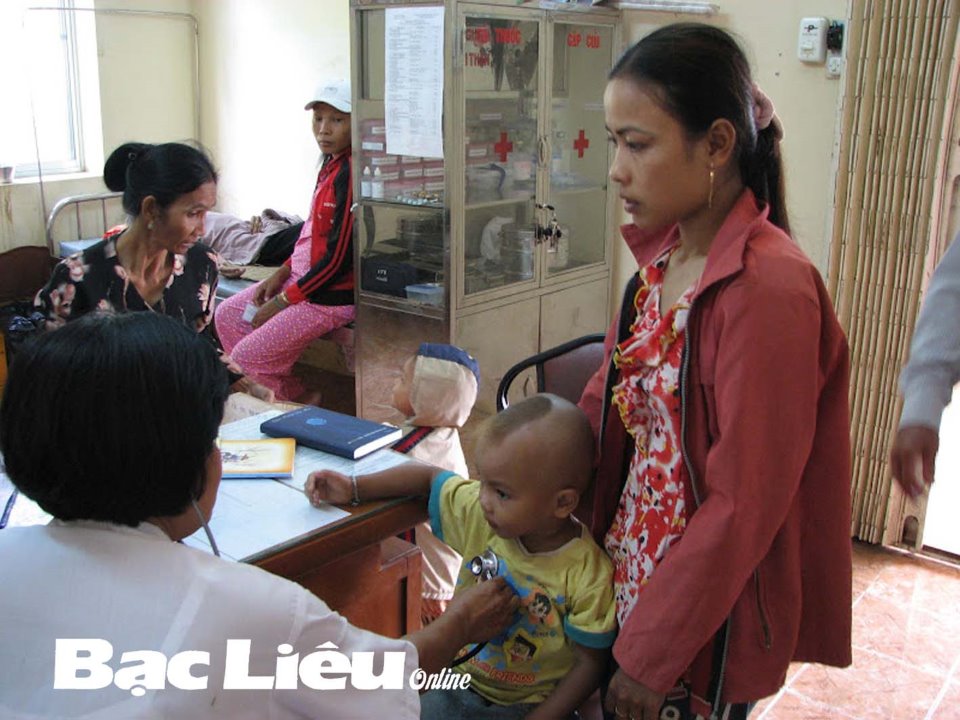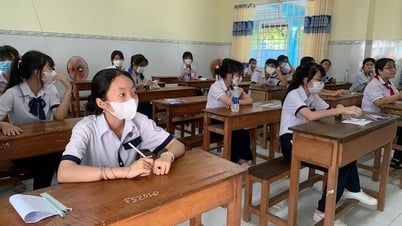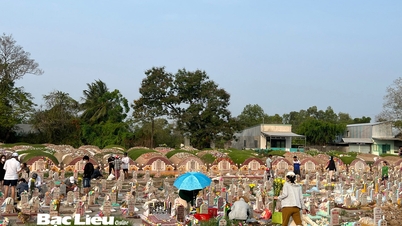The hot and humid summer weather creates favorable conditions for many types of viruses, bacteria, and insects to develop, along with increased human travel, creating favorable conditions for the risk of increased and outbreaks of diseases such as dengue fever, hand, foot, and mouth disease, diarrhea caused by Rota virus, dysentery, typhoid, viral encephalitis, meningococcal encephalitis, Japanese encephalitis, diphtheria, whooping cough and some other infectious diseases. The elderly and children are susceptible to diseases caused by hot and humid weather.
Distribute leaflets to promote dengue fever prevention to people.
Symptoms and prevention of dengue fever
In the southern region, dengue fever occurs year-round but peaks during the rainy season from May to November. Since there is no vaccine, the best way to prevent the disease is to kill mosquito larvae and use measures to limit mosquito bites such as sleeping under mosquito nets, using mosquito coils or mosquito repellent creams for children.
Dengue fever is an infectious disease caused by Aedes Aegypti mosquitoes carrying the Dengue virus. After biting a person, the infected person will start to develop the disease with symptoms of continuous high fever, and red hemorrhagic spots appear under the skin after 4-6 days.
For mild dengue patients, the patient can be treated at home as prescribed by the doctor. However, from the 3rd to 7th day, the patient, especially children, needs to be closely monitored to detect symptoms of pre-shock due to blood loss. In severe cases, the disease causes massive bleeding, liver and kidney complications, cerebral hemorrhage and death.
Pregnant women in the early stages of dengue fever are very dangerous. The disease can cause fetal distress, premature birth, stillbirth due to fever and prolonged dehydration or damage to liver and kidney function. Currently, in Vietnam, there is no vaccine to prevent dengue fever and no specific treatment. According to the recommendations of the health sector, people need to take measures to protect themselves and their families such as: Regularly clean the living space, cover all water containers to prevent mosquitoes from laying eggs. Sleep under mosquito nets even during the day. Coordinate with the ward and commune to spray chemicals to prevent epidemics. As soon as dengue fever is detected, go to the nearest medical facility for examination, treatment and monitoring. Do not self-treat at home.
When children show signs of infectious diseases, they should be taken immediately to a medical facility for examination and proper treatment. Illustration: CK
Things to know about hand, foot and mouth disease
Besides dengue fever, hand, foot and mouth disease is a disease that often breaks out in the summer, is easily spread from person to person and can develop into an epidemic. Symptoms of hand, foot and mouth disease often begin with fever, loss of appetite, sore throat and fatigue. Red, watery spots begin to appear as a rash on the skin of the hands and feet, possibly on the knees, elbows and buttocks of the child. If not treated promptly, the disease can progress very quickly and cause death within 24 hours.
Currently, there is no vaccine to prevent hand, foot and mouth disease. To proactively prevent it, the Ministry of Health recommends that people and the community take some measures such as: Wash your hands with soap many times a day, especially before preparing food, before meals, after going to the toilet. Practice good food hygiene, eat cooked food, drink boiled water. Regularly clean surfaces and daily contact tools such as toys, doorknobs, stair handrails, table/chair surfaces, floors. Do not let children come into contact with sick people or people suspected of having the disease. When detecting signs of suspected illness in children, take them to the doctor or immediately notify the nearest medical facility.
Chickenpox
Chickenpox is an infectious disease caused by the Varicella Zoster virus (VZV). The disease is transmitted directly through the respiratory tract when in contact with nasal and throat secretions of an infected person through talking, coughing, and sneezing. Chickenpox can also be transmitted indirectly through the daily living items of the patient. In particular, pregnant women in the first 3 months with chickenpox will seriously affect the formation, development and health of the fetus.
The initial symptoms of the disease are blisters on the skin and mucous membranes, high fever, weakness, and fatigue. Chickenpox spreads rapidly, is transmitted directly from person to person, and can become an epidemic if not controlled promptly. Chickenpox can be completely cured after 1-2 weeks if treated and cared for promptly and properly; but if not detected and treated properly, the disease can cause many dangerous complications such as meningitis, encephalitis, pneumonia, etc.
There is no specific treatment for chickenpox, but it can be easily prevented by vaccination. The chickenpox vaccine is indicated for children from 12 months of age and adults who have never had the disease. Children from 12 months to 12 years of age, the vaccination schedule includes 2 injections, each injection at least 3 months apart. Children over 13 years of age and adults, the vaccination schedule includes 2 injections, each injection at least 1.5 months apart.
For women before pregnancy, the Ministry of Health recommends that they get vaccinated against chickenpox at least 1 month before pregnancy. In addition, people with chickenpox need to be isolated until the blisters have completely dried. The patient should stay in a separate room with windows, cool air, enough sunlight and should take medication as prescribed by the doctor.
Truc Ly (TH)
Source link








![[Photo] Top players gather at the 2025 Nhan Dan Newspaper National Table Tennis Championship](https://vphoto.vietnam.vn/thumb/1200x675/vietnam/resource/IMAGE/2025/5/23/9ad5f6f4faf146b08335e5c446edb107)
![[Photo] Anh Hoang - Dinh Duc successfully defended the men's doubles championship of the National Table Tennis Championship of Nhan Dan Newspaper](https://vphoto.vietnam.vn/thumb/1200x675/vietnam/resource/IMAGE/2025/5/23/d6ab3bcac02c49928b38c729d795cac6)






















































































Comment (0)